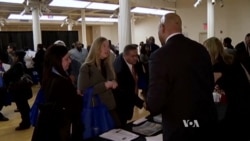Top officials of the U.S. central bank raised the benchmark interest rate slightly Wednesday, as the recovering economy no longer seems to need quite as much of the boost it gets from ultra-low rates.
The Federal Reserve raised its short-term rate a quarter of a percent, to a range between 1 and 1.25 percent.
To cope with the recession that started in 2007, the Fed cut interest rates nearly to zero, a record low, in a bid to cut the cost of borrowing and encourage economic activity and cut unemployment.
Watch: US Central Bank Hikes Key Interest Rate Amid Weaker Than Expected Data
With the jobless rate cut from 10 percent to just 4.3 percent recently, the recovering economy no longer needs so much help from low interest rates. Wednesday's action is just the latest in a gradual series of rate hikes that are moving interest rates back toward the rates usually seen over the past few decades.
Officials worry that keeping rates too low for too long could spark a burst of inflation that could hurt the economy. Fed officials have been trying to get inflation to rise to a low but manageable rate of about 2 percent. The inflation rate remains below this target.
Fed officials also said they would reduce the central bank's huge holding of bonds and other securities later this year. During the recession, the Fed purchased $4.3 trillion worth of financial products in a complex bid to further boost growth by cutting long-term rates. The plan calls for gradually reducing these holdings in ways that do not disrupt markets.
The Fed's leaders say they expect the world's largest economy to grow at a 2.2 percent annual rate this year, and expand a bit more slowly in 2018 and 2019. They predict a slight decrease in the unemployment rate, and a slight rise for the inflation rate.






